What is Dental Implant ?
Dental Implant
A dental implant is a surgical component that is placed into the jawbone to support a dental prosthesis, such as a crown, bridge, or denture. It is an artificial tooth root that provides a stable foundation for the replacement teeth.
The dental implant itself is typically made of titanium, a biocompatible material that integrates with the bone through a process called osseointegration. This fusion between the implant and the bone creates a strong and durable anchor for the prosthetic tooth.
The process of getting a dental implant usually involves several steps:
Evaluation and Planning: Your dentist or oral surgeon will evaluate your oral health, take X-rays or CT scans to assess the bone structure, and determine if you’re a suitable candidate for a dental implant. They will also develop a treatment plan tailored to your specific needs.
Implant Placement: The dental implant is surgically placed into the jawbone under local anesthesia. The procedure involves making an incision in the gum tissue to expose the bone and drilling a hole to insert the implant. Afterward, the gum tissue is stitched back together.
Osseointegration: Over a period of several months, the implant integrates with the surrounding bone through osseointegration. During this healing phase, it’s crucial to maintain good oral hygiene and follow any instructions given by your dentist.
Abutment Placement: Once osseointegration has occurred, a minor surgical procedure is performed to attach an abutment to the implant. The abutment is a connector that protrudes above the gum line and serves as the anchor for the artificial tooth.
Prosthesis Placement: After the gums have healed around the abutment, your dentist will take impressions of your mouth to create a custom-made dental prosthesis (crown, bridge, or denture). This prosthesis will be attached to the abutment, completing the dental implant restoration.
Dental implants offer several advantages over other tooth replacement options, such as improved aesthetics, enhanced chewing ability, and preservation of bone structure. However, not everyone is a suitable candidate for dental implants. Factors such as overall health, oral health, and the quantity and quality of the jawbone need to be considered

